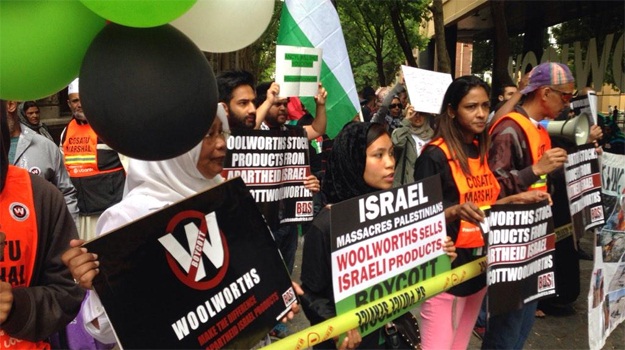Following an intense two year campaign, the local Palestine solidarity movement has announced an end to the controversial #BoycottWoolworths campaign. The #BoycottWoolworths campaign was launched in August 2014 in response to Israel’s brutal 51 day assault on Gaza, which killed more than 2,100 Palestinians. The #BoycottWoolworths campaign called for the complete boycott of Woolworths due to its Israeli trade relations.
Under the National Coalition 4 Palestine (NC4P), the campaign was spearheaded by groups including BDS South Africa, the Palestine Solidarity Alliance (PSA), COSATU, Palestine Solidarity Campaign, Muslim Judicial Council, Media Review Network, Open Shuhada Street (OSS), Palestine Solidarity Association (PSA), ANC YL, SACP, the YCL, SASCO, the Congress of South African Students (COSAS) and various other organisations.
“The campaign had enormous successes over the last two years. However, having achieved several goals of the campaign we have now revisited our strategic imperatives and announce the end of the blanket boycott of Woolworths to broaden the campaign to now target all Israeli products in any store. Included in our strategic imperatives, going forward, will be to also ensure that in line with labelling legislation of the DTI, that no falsely-labeled Israeli products are sold in South Africa,” said BDS South Africa spokesperson Kwara Kekana.
Some achievements and goals met:
– The #BoycottWoolworths campaign, unlike any other consumer boycott before it, had the widespread success of bringing the BDS boycott of Israel into people’s homes and lives; it took an abstract concept and made it a real campaign for many families across the length and breadth of South Africa. It involved school pupils taking a stand and parents adopting family “dinner time resolutions”.
– Another achievement of the campaign was the undertaking, and subsequent affirmation by Woolworths at its recent AGM, that it will not purchase any Israeli goods from the occupied Palestinian territories.
– In a first for South Africa, activists also turned to large scale shareholder activism having bought several individual shares in the company, as well as convincing larger shareholders to lend campaigners their AGM proxies. The allowed activists to attend two Woolworth AGM’s and take the company to task on various issues including its trade with Israel and other related issues such as labour exploitation by the company and local procurement
– The campaign also exposed Woolworths for its false labelling of Israeli products which led to a national industry-wide investigation by the Consumer Commission
– The campaign saw some of the best from activists and community members in the form of creative protest like regular flashmobs
– The campaign received widespread media attention, locally and internationally, including coverage in, among others, The New York Times, Rolling Stones Magazine, Sunday Times, City Press, Business Day, The Star & Argus. It had tremendous success on social media from hilarious tweets and posters to serious FaceBook debates and Instagram images.
– The #BoycottWoolworths campaign was also subject of various academic studies, including one by a pro-Israeli researcher who found, through a survey of Woolworths customers that formed part of his research, that “80% of respondents said they know who the BDS are, and 85% knew about the protests and boycott held against Woolworths by the BDS.”
– The #BoycottWoolworths campaign and Israel boycott also received support from various South African Government Ministers, religious leaders, artists, movie stars
– Due to its trade with Israel and negative publicity from the #BoycottWoolworths campaign, Woolworths also suffered brand damage and at its height, according to a professional media report: “three out of every ten articles about Woolworths (outside of Twitter) referred to the boycott [of the company]”.
– The company also suffered through shop closures because of major and regular #BoycottWoolworths protests sit-ins, legal costs, costs of hiring private investigators to “spy” on activists
– The largest shareholder of the company, the Public Investment Corporation(PIC), after involvement and calls from several public sector unions has also launched its own investigations into the company’s trade with Israel among other issues.
Kekana said they would now turn to expanding the consumer part of the BDS campaign in South Africa in a different way by focusing on the general boycott of all Israeli products.
“The #BoycottWoolworths campaign was a bold move in that it was the first comprehensive consumer boycott in the history of South Africa since 1994. There were many who supported the campaign and the achievements were important to the ongoing struggle in solidarity with Palestinians. We learned a lot from the campaign and hope to use that knowledge in our future campaigns and the struggle for a free Palestine,” she said.
“The failure to respond to human rights activists led to millions wasted because of both corporate arrogance and a deliberate decision to choose Israel over the brand’s image, profits and commitment to human rights.”
The NC4P has thanked South Africans for respecting the boycott and educating other family and friends to participate.
“You were the strength, muscle and power of the campaign and the reason for the above achievements. Finally, the NC4P understands and accepts that many activists may never return to Woolworths. We again reiterate our humbleness to members of the community and public who joined the campaign,” NC4P said in a statement.
The collective has set up an online blog for members of the public to leave behind one’s personal or family’s story from the #BoycottWoolworths campaign.
Visit www.bdssouthafrica.com/boycottwoolworths-share-your-experience






 WhatsApp us
WhatsApp us 

